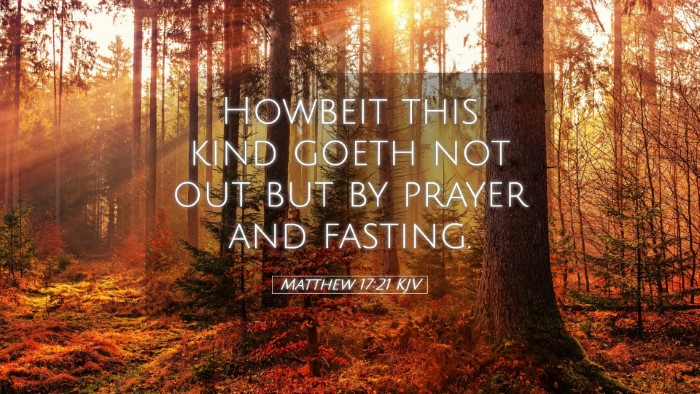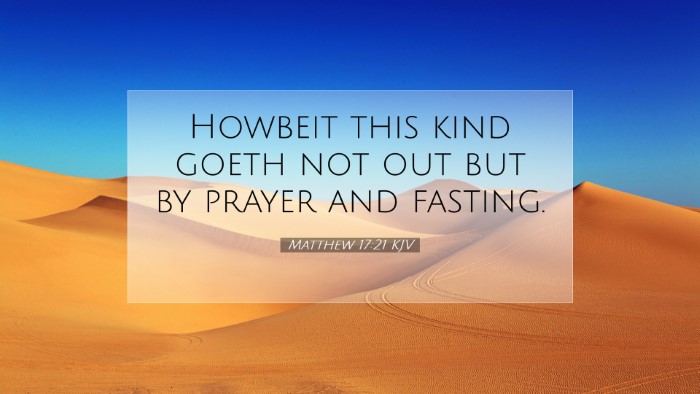Commentary on Matthew 17:21
Verse Reference: Matthew 17:21 (KJV) - "Howbeit this kind goeth not out but by prayer and fasting."
Introduction
The context of Matthew 17:21 emerges from a significant event in the life of Jesus and his disciples. Following the transfiguration of Christ, the disciples faced a challenge in casting out a demon from a boy, which they failed to do. This verse, however, provides a profound insight into the nature of spiritual warfare and the preparation required to engage in it effectively.
Contextual Analysis
This verse comes after a discourse on the necessity of faith. The disciples' inability to cast out the demon was met by Jesus' admonition and explanation regarding the power of prayer and fasting. Matthew Henry emphasizes that this verse highlights not just what is required to expel certain demons but speaks to a broader truth about the spiritual condition necessary for all of Jesus' followers.
The Importance of Prayer and Fasting
Albert Barnes remarks that prayer and fasting are means of preparing oneself for spiritual battles. They cultivate a deep reliance on God and signify a serious commitment to seeking His will and strength. Fasting, as part of the spiritual discipline, helps to humble the believer and draw them closer to God, ultimately enhancing their spiritual authority.
Prayer:
Prayer is communication with God. Adam Clarke notes that it is essential for believers to maintain an ongoing dialogue with the Lord. This relationship empowers them in their daily lives and equips them with spiritual insight and strength to confront challenges presented by the powers of darkness.
Fasting:
Fasting serves to refine one's focus. Henry points out that fasting shifts the believer’s attention from earthly things to spiritual matters, amplifying their devotion. It encourages a posture of humility and earnestness, making them more receptive to God's guidance and power.
Types of Spiritual Challenges
The specific reference to "this kind" indicates a recognition of various levels of spiritual challenges. Barnes explains that just as there are different categories of demons, there are also varied spiritual barriers and issues that require different levels of preparation and engagement.
The Role of Faith
In related passages, such as Matthew 17:20, Jesus mentions the power of faith, illustrating that faith, even as small as a mustard seed, holds immense potential. Clarke expounds on this by stating that faith obligates God to act in accordance with His promises. Yet Jesus, here, emphasizes that without accompanying practices of prayer and fasting, even those with faith may find themselves ineffectively confronting spiritual situations.
Practical Implications for Believers
Preparing for Ministry: Pastors and leaders must recognize the importance of personal and communal prayer and fasting. The essence of these practices should not be viewed as mere rituals but rather as foundational to experiencing God's power and presence in ministry.
- Devote Time to Prayer: Establish consistent prayer times, both personally and collectively.
- Incorporate Fasting: Teach on the benefits of fasting and provide opportunities for the congregation to engage in it regularly.
- Encourage Spiritual Discernment: Leaders should guide their communities to discern the specific types of spiritual warfare they may face and seek God's guidance through prayer and fasting.
Conclusion
Matthew 17:21 serves as a vital reminder that true spiritual authority is rooted in a life committed to prayer and fasting. The insights from respected theologians highlight that preparation for spiritual battles requires more than knowledge or earnestness; it demands a deep, abiding connection with God through these disciplines. As we embrace the call to prayer and fasting, may we find ourselves empowered to confront any spiritual challenge, equipped to be agents of God's transformative power in the world.


